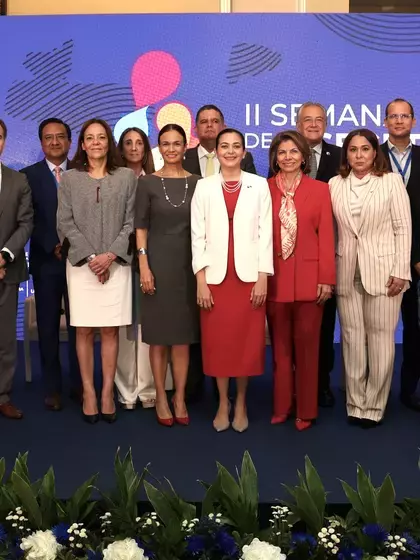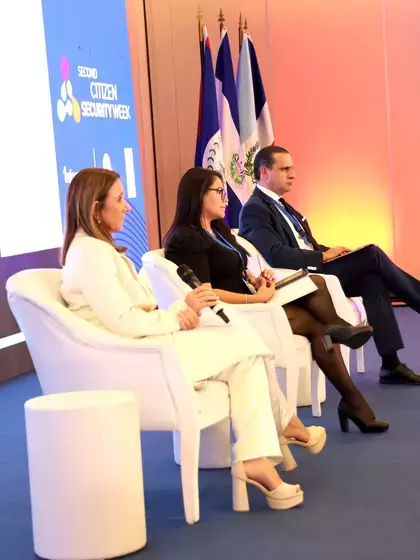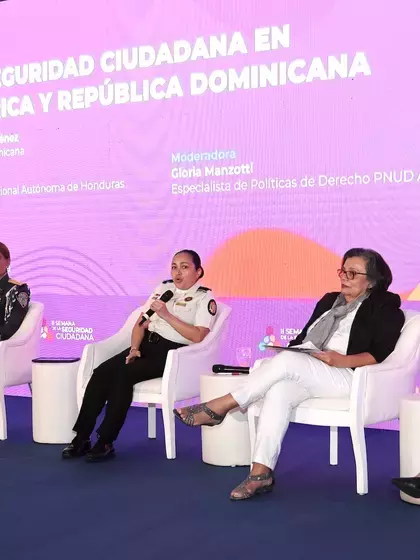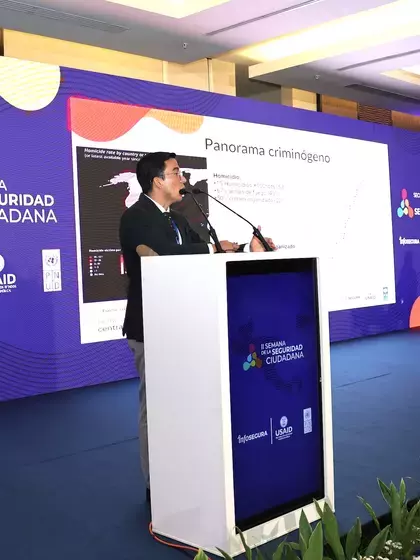
Laura Chinchilla and Oscar Naranjo, a high-level exchange
Citizen Security Week hosted by InfoSegura started its first day with a double keynote address about “Developments and challenges for Citizen Security in the Region.” Both speakers are recognized worldwide for their commitment to democracy and human rights. One was former President of Costa Rica Laura Chinchilla and the other former Vice President of Colombia and retired police General Oscar Naranjo.
Following the opening remarks delivered to a full and expectant audience, InfoSegura Regional Project Coordinator Marcela Smutt opened the floor to the two politicians, who covered a range of ideas to inspire participants and maintain their commitment to ensuring regional security for all citizens.
The initial intervention was made by former Colombian Vice President Oscar Naranjo, who stressed the importance of security as a basic human right essential for strengthening democracy and the rule of law.
Naranjo expressed his appreciation of the work undertaken by InfoSegura, which he remarked, “has contributed for over 10 years throughout the region, achieving remarkable progress in the reduction of violence.” He made an ethical and political call, reminding all present of the suffering of the victims, and advocated for a “transcendent approach,” when bringing them to mind.
General Naranjo provided a contextualization of the current state of affairs worldwide, describing it as a pivotal moment in human history. He cited the “Arab Spring” as an instance of citizen outrage that spread throughout the planet, reaching Latin America and the Caribbean. He emphasized that the driving force behind this outrage involved climate change and other issues that are a source of increasing concern among younger generations.
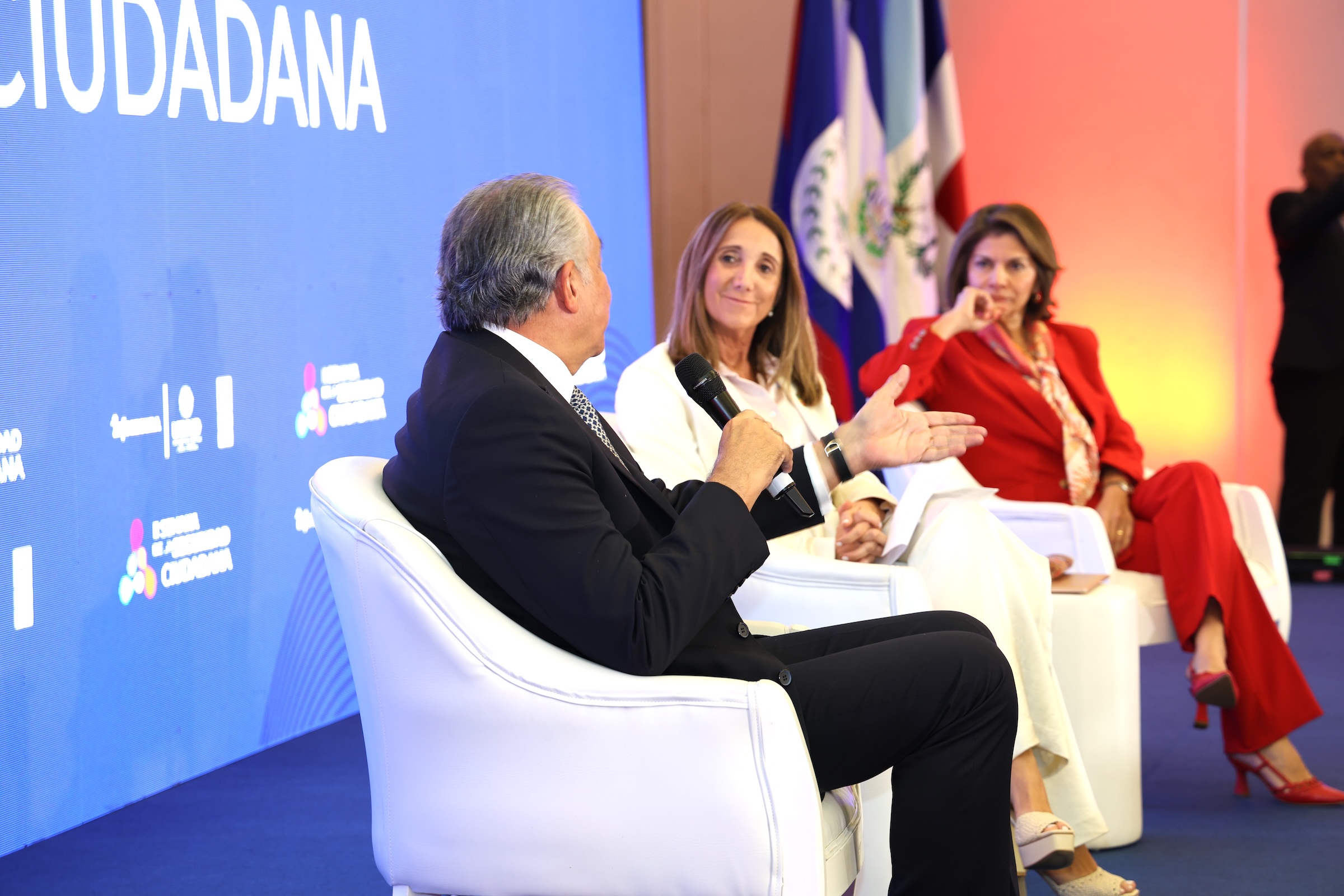
Oscar Naranjo, Marcela Smutt and Laura Chinchilla during the inaugural session of Second Security Week.
He noted the impact that social media has on the way that security is perceived, noting the tendency to heighten negativity. He expressed further concern regarding the rise of political polarization and populism, emphasizing the need to safeguard democratic values.
During the final minutes of his intervention, General Naranjo emphasized the importance of citizen engagement in the design and oversight of security policy. He proposed the pooling of knowledge and closer collaboration between academia, governments and think tanks to better understand the complexity of security challenges in the region.
Laura Chinchilla and Oscar Naranjo discuss InfoSegura during the Second Citizen Security Week.
Next Ms. Laura Chinchilla addressed the audience. The former Head of State of Costa Rica underscored the importance of democracy, reiterating that “without it, we cannot speak of sustainable security.” She drew attention to the need for a comprehensive approach to violence and crime and highlighted the need for evidence-based policymaking, “in addition to the usual recordkeeping of crime statistics.”
Former President Chinchilla referred to the current transnational challenge to democratic coexistence. Discussions about security and proposals, “often focus on immediate solutions instead of addressing the structural causes.” She focused on the urgency of getting to the roots of poverty and inequality that exacerbate insecurity.
“Without security, democracy is not viable and without democracy, there is simply no security,” Laura Chinchilla, former President of Costa Rica.
Security is “a human right with ethical implications,” Ms. Chinchilla emphasized it is, “an essential public good and a condition for sustainable development.” She asserted that the responsibility cannot be left to only some institutions and called for more extensive collaboration, proposing that more efforts need to be made to provide effective responses to insecurity. She advocated for comprehensive, transparent policies based on the rule of law.
The current model lacks sustainability, primarily due to exogenous factors like the post-COVID 19 decline in human development, ongoing deficiencies in the rule of law and the escalating influence of organized crime, she warned.
Former President Chinchilla underscored the need to prioritize policies that promote social cohesion and combat impunity. She called for measures to be taken against organized crime and strategies to reduce public anxiety. “Without security, democracy is not viable and without democracy, there is simply no security,” were her closing words.

